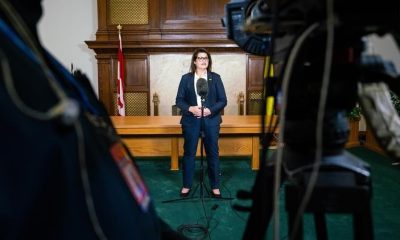Business
Stock markets see-saw as investors confront economic effects of coronavirus spreading – CBC.ca
A day after their worst declines in decades, stock markets and the price of oil see-sawed as investors faced up to the potential of COVID-19 spreading and hurting economies around the world.
After climbing at the open of trading Tuesday, the S&P/TSX Composite Index, the S&P 500 and the Dow Jones Industrial Average all gave up their gains nearing midday before inching back into the green in the afternoon.
Monday was the worst day for the TSX since 1987. U.S. markets saw their deepest declines since the financial crisis in 2008, as investors digested the double whammy of a coronavirus threatening to bring the global economy to its knees, and Saudi Arabia kicking off a race with Russia to the bottom in oil prices.
The oil price fell to its lowest level in years on Monday, before a mini-rally built on expectations that even Saudi Arabia must know it can’t withstand prices this low forever.
“There haven’t been any signs of movement from Saudi Arabia or Russia on their price war, so this situation could drag on and the market may remain volatile,” said Colin Cieszynski, chief market strategist at SIA Wealth Management.
The oil rally spread into stocks as bargain hunters sifted through the wreckage, but any optimism based on anticipation of some sort of stimulus package from Washington, quickly dissipated after they heard the details of what Trump was proposing.
Trump points to Fed chair
Intending to calm the fears of financial markets over the impact of the epidemic, Trump told reporters Monday he is seeking “very substantial relief” to the payroll tax. Trump also said he was seeking help for hourly-wage workers to ensure they’re “not going to miss a paycheque” and “don’t get penalized for something that’s not their fault.”
He then pointed the finger at his hand-picked central banker for the market’s problems, attacking the Fed chair with the president’s weapon of choice: Twitter.
Our pathetic, slow moving Federal Reserve, headed by Jay Powell, who raised rates too fast and lowered too late, should get our Fed Rate down to the levels of our competitor nations. They now have as much as a two point advantage, with even bigger currency help. Also, stimulate!
—@realDonaldTrump
He lamented the Federal Reserve being “pathetic” and “slow moving” with regard to interest rates, arguing that even cheaper money would cause the market contagion to cure itself.
There was a slight recovery in the afternoon after U.S. Vice-President Mike Pence made it clear that the federal government is standing by and willing to step in to do whatever it takes to battle the virus.
Pence said that large U.S. health insurers had all agreed to waive the co-pay portion of the coronavirus test for their customers, which should help more tests to be distributed and give policy makers better information on the scale of the outbreak.
Shortly before 1 p.m. ET, the TSX, Dow and S&P were all about one per cent higher on the day.
The coronavirus that causes COVID-19 has spooked stock market investors this week as they worry about the worst-case scenario for corporate profits and the economy, where factories and supply chains are shut around the world due to quarantines and people stay huddled at home instead of working or spending.
That’s why many say the market will continue to swing sharply at least until the number of new cases decelerates.
“Markets don’t trade on good or bad, they trade on better or worse,” said Alec Young, managing director of global markets research at FTSE Russell.
“I would expect the authorities to pull out all the stops to reduce uncertainty,” Young said. “This may be their one opportunity to do that.”
Business
All Magic Spells (TM) : Top Converting Magic Spell eCommerce Store


Product Name: All Magic Spells (TM) : Top Converting Magic Spell eCommerce Store
All orders are protected by SSL encryption – the highest industry standard for online security from trusted vendors.

All Magic Spells (TM) : Top Converting Magic Spell eCommerce Store is backed with a 60 Day No Questions Asked Money Back Guarantee. If within the first 60 days of receipt you are not satisfied with Wake Up Lean™, you can request a refund by sending an email to the address given inside the product and we will immediately refund your entire purchase price, with no questions asked.
Business
Turn Your Wife Into Your Personal Sex Kitten


Product Name: Turn Your Wife Into Your Personal Sex Kitten
All orders are protected by SSL encryption – the highest industry standard for online security from trusted vendors.

Turn Your Wife Into Your Personal Sex Kitten is backed with a 60 Day No Questions Asked Money Back Guarantee. If within the first 60 days of receipt you are not satisfied with Wake Up Lean™, you can request a refund by sending an email to the address given inside the product and we will immediately refund your entire purchase price, with no questions asked.
Business
CPC Practice Exam


Product Name: CPC Practice Exam
Click here to get CPC Practice Exam at discounted price while it’s still available…
All orders are protected by SSL encryption – the highest industry standard for online security from trusted vendors.

CPC Practice Exam is backed with a 60 Day No Questions Asked Money Back Guarantee. If within the first 60 days of receipt you are not satisfied with Wake Up Lean™, you can request a refund by sending an email to the address given inside the product and we will immediately refund your entire purchase price, with no questions asked.
-

 News20 hours ago
News20 hours agoDefying Convention to Deepen Connections: Booking.com’s 8 Travel Predictions for 2025
-

 News6 hours ago
News6 hours agoAfter hurricane, with no running water, residents organize to meet a basic need
-

 Sports7 hours ago
Sports7 hours agoIn The Rings: Curling Canada still looking for Canadian Curling Trials title sponsor
-

 Politics7 hours ago
Politics7 hours agoN.B. election debate: Tory leader forced to defend record on gender policy, housing
-

 News7 hours ago
News7 hours agoAlberta government shifts continuing care from Health to Seniors Ministry
-

 News7 hours ago
News7 hours agoBuhai, Green and Shin lead in South Korea after 8-under 64s in first round
-

 News7 hours ago
News7 hours agoManitoba government halts school building plan, says other methods will be found
-

 News7 hours ago
News7 hours ago‘Significant overreach’: Ontario municipalities slam province over bike lane rules
































